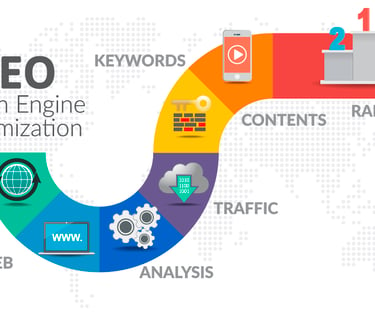What is SEO & Do You Need it?
You have definitely heard of SEO by now. This article will explain what it is and why it is necessary if you want to be discovered online.
SEO
IHJ Graphics & Marketing
4/18/20232 min read


Search engine optimization, or SEO, is the practice of optimizing a website to increase its visibility and ranking on search engine results pages (SERPs). In today's digital age, SEO is an essential part of any online marketing strategy. In this article, we'll explore what SEO is, why it's important, and some of the key factors that impact SEO.
What is SEO?
Again, SEO is the process of optimizing a website for search engines. This involves a range of tactics, including keyword research, on-page optimization, content creation, link building, and more. The goal of SEO is to increase the visibility of a website in search engine results pages (SERPs) and drive organic traffic to the site.
Why is SEO important?
SEO is important for several reasons. First and foremost, it helps businesses increase their visibility in search engine results pages, which can lead to more website traffic and ultimately more conversions. In addition, SEO is a cost-effective way to attract customers, as it targets users who are already searching for products or services related to your business.
Another reason why SEO is important is that it helps to build trust and credibility with potential customers. When your website appears at the top of search engine results pages, it's seen as a trustworthy source of information, which can lead to more conversions and repeat business.
Finally, SEO is important because it's a long-term strategy. Unlike paid advertising, which requires ongoing investment, SEO can continue to drive traffic and generate leads for months or even years after the initial investment.
Key factors that impact SEO
There are several factors that impact SEO, including:
Keyword research: Keyword research involves identifying the keywords and phrases that your target audience is searching for. By including these keywords in your website content, you can increase your chances of ranking for those terms in search engine results pages.
On-page optimization: On-page optimization involves optimizing your website's pages for specific keywords and phrases. This includes optimizing your page titles, meta descriptions, header tags, and content.
Content creation: Content creation is a key part of SEO. By creating high-quality, informative content that is optimized for specific keywords and phrases, you can attract more traffic to your website and improve your search engine rankings.
Link building: Link building involves getting other websites to link back to your site. This helps to build your website's authority and can improve your search engine rankings.
User experience: User experience (UX) is an important factor in SEO. A website that is easy to navigate and provides a good user experience is more likely to rank well in search engine results pages.
That is the nutshell version of SEO, clearly it is a critical component of any online marketing strategy. By optimizing your website for search engines, you can attract more traffic, generate more leads, and ultimately increase your revenue. Whether you're just getting started with SEO or looking to improve your existing strategy, there are many resources available to help you achieve your goals.

©2004-2026 IHaveJake.com PRIVACY


